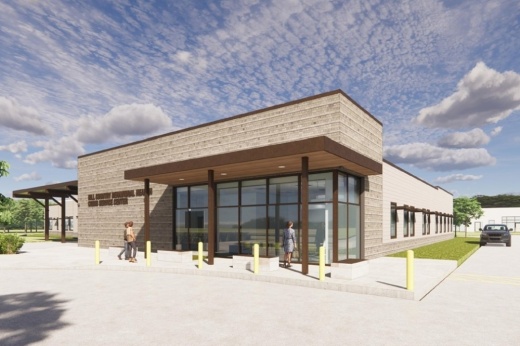The new $8.65 million facility, officially called the Comal County Mental Health Extended Observation Unit and Crisis Residential Unit Facility, will serve the general public.
“This is not just for people in the criminal justice system—this is for anyone in Comal County who is in crisis and needs immediate help,” said Deborah Wigington, judge for Comal County Court at Law No. 3. The Comal County Mental Health Court program—established in 2021—operates out of Wigington’s court.
Why now?
The new facility will be built by Comal County and operated by Hill Country Mental Health and Developmental Disabilities.
Funded through federal American Rescue Plan Act grants, the facility will provide a vital resource for residents experiencing mental health emergencies, Comal County Administrator Tom Hornseth said.
“We’re sending people all the way to San Antonio, Austin or even Kerrville for treatment,” said Wigington. “That means taking our officers off the streets and paying for expensive ambulance services. It’s traumatic for the individual, and it disconnects them from their support system here at home.”
By keeping individuals within their community, a new crisis stabilization unit aims to improve outcomes and reduce the revolving door of the criminal justice system, Wigington said.
Hill Country MHDD will coordinate closely with the Comal County Mental Health Coalition, which includes law enforcement, courts and other stakeholders, said Landon Sturdivant, deputy CEO of Hill Country MHDD.
“The goal is to reduce psychiatric hospital utilization and divert individuals from jails to appropriate care,” Sturdivant said.
Law enforcement officers and judges will have the option to send individuals in mental health crises to the facility as an alternative to jail when appropriate.
In addition, those experiencing crises—whether referred by local hospitals, family members or 911 responders—can be directed to the facility for stabilization and care, offering a quicker and more appropriate alternative to emergency rooms.
The $4.5 million in annual operating costs will cover a staff of around 50 employees. Hill Country MHDD will also provide $1 million in furniture and equipment for the facility, said Charles Rittenhouse, chief financial officer of Hill Country MHDD.
The facility is set to break ground in December, with an estimated 10-12 month construction timeline, Hornseth said. Once completed, it will be operated by Hill Country MHDD, he said.
The background
The decision to build the new mental health facility comes as Comal County grapples with a growing mental health crisis.
In September, Hill Country MHDD received 183 crisis hotline calls in Comal County, the majority from hospital emergency rooms, followed by concerned residents, Sturdivant said.
“We have a number of calls from law enforcement or the jail that we may respond to, but the vast majority of the calls do come from hospital emergency rooms,” said Sturdivant, who added that the new center will reduce the burden on hospital emergency departments.
Wigington said she’s witnessed firsthand the strain on local resources, as she handles the judicial aspects of mental health cases, including signing warrants for evaluations and orders of protective custody.
“It’s a huge burden on our community, and it’s not the best way to care for people in crisis,” Wigington said.
Who does it serve?
The facility will serve as a resource for residents across the organization’s 19-county service area experiencing acute mental health crises, Sturdivant said.
The new facility will offer a 16-bed facility with a mix of secured and unsecured rooms, catering to both voluntary and involuntary patients experiencing mental health emergencies.
The center aims to provide an alternative to hospitalization, reducing the burden on emergency rooms and the criminal justice system, said Tod Citron, CEO of Hill Country MHDD.
Currently, residents in Comal County needing crisis stabilization are often sent to other cities, which disconnects them from their support system and strains local resources, such as law enforcement and emergency services, Wigington said.
By offering comprehensive assessment, psychiatric evaluation and initial stabilization within the local community, the facility hopes to improve outcomes and facilitate a smooth transition to ongoing mental health services, Sturdivant said.
Sturdivant explained that keeping patients in their local community during the critical early stages of treatment is expected to lead to better long-term recovery and reintegration, as opposed to the disruption that can occur with out-of-town placements.
Hill Country MHDD, which operates 12 outpatient clinics in the region, will work closely with the Comal County Mental Health Coalition, which includes law enforcement, courts and other stakeholders, to ensure integrated support and care for those in crisis, Sturdivant said.
The facility is expected to serve approximately 200 individuals per year, with a target occupancy of 80%.
“We are considered the safety net mental health provider. ... We mostly serve folks who are indigent. ... That’s probably 99% who we serve,” Citron said.
What's next?
On Oct. 17, Hill Country MHDD broke ground on a similar facility in Uvalde, Citron said.
“Diversion centers like this one are emerging across Texas as alternatives to hospitalization,” Citron said. “They help fill gaps left by the shortage of state hospital beds and staffing challenges, which have limited the state’s ability to keep some psychiatric wings open.”
Once the construction is finished, Comal County will retain ownership of the new facility.
Hill Country MHDD will track and report various metrics from the facility, including occupancy, services provided and crisis resolution outcomes.
Here is the timeline of the construction for the facility:
- December 2024: Comal County plans to break ground on the facility
- 10-12 months: Expected build-out length
- End of 2025: The facility is expected to be open and operational
- Suicide and Crisis Lifeline: 988
- Hill Country MHDD Centers' Crisis Hotline: 877-466-0660
- Bluebonnet Trails Community Services: 800-841-1255





